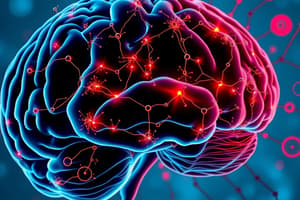Podcast
Questions and Answers
Match the following branches of psychology with their primary focus:
Match the following branches of psychology with their primary focus:
Clinical Psychology = Diagnosis and treatment of mental disorders Cognitive Psychology = Mental processes such as perception and memory Developmental Psychology = Human development across the lifespan Social Psychology = How people think and behave in social situations
Match the following research methods in psychology with their descriptions:
Match the following research methods in psychology with their descriptions:
Surveys and Questionnaires = Self-report measures to gather information Experiments = Controlled studies to examine cause-and-effect relationships Observational Studies = Systematic observations of behavior in natural settings Correlational Studies = Examinations of relationships between variables
Match the following key concepts in psychology with their definitions:
Match the following key concepts in psychology with their definitions:
Nature vs. Nurture = The debate about genetics and environment Consciousness = The state of being aware of one's surroundings Motivation = The driving forces behind human behavior Learning = The process of acquiring new knowledge and skills
Match the following branches of psychology with their primary areas of study:
Match the following branches of psychology with their primary areas of study:
Match the following research methods in psychology with their characteristics:
Match the following research methods in psychology with their characteristics:
Match the following key concepts in psychology with their descriptions:
Match the following key concepts in psychology with their descriptions:
Match the following branches of psychology with their primary areas of focus:
Match the following branches of psychology with their primary areas of focus:
Match the following research methods in psychology with their applications:
Match the following research methods in psychology with their applications:
Flashcards are hidden until you start studying
Study Notes
Definition of Psychology
Psychology is the scientific study of behavior and mental processes. It aims to understand individuals and groups by studying the underlying psychological processes and mechanisms that influence their thoughts, feelings, and behaviors.
Branches of Psychology
There are several branches of psychology, including:
- Clinical Psychology: focuses on the diagnosis, assessment, and treatment of mental disorders
- Cognitive Psychology: examines mental processes such as perception, attention, memory, language, and problem-solving
- Developmental Psychology: studies human development across the lifespan, including cognitive, social, and emotional development
- Social Psychology: explores how people think, feel, and behave in social situations
- Neuropsychology: focuses on the relationship between the brain and behavior
Research Methods in Psychology
Psychologists use various research methods to study behavior and mental processes, including:
- Surveys and Questionnaires: self-report measures to gather information about attitudes, beliefs, and behaviors
- Experiments: controlled studies to examine cause-and-effect relationships
- Observational Studies: systematic observations of behavior in natural or laboratory settings
- Correlational Studies: examinations of relationships between variables
Key Concepts in Psychology
Some key concepts in psychology include:
- Nature vs. Nurture: the debate about the relative contributions of genetics and environment to human behavior
- Consciousness: the state of being aware of one's surroundings, thoughts, and feelings
- Motivation: the driving forces behind human behavior, including needs, desires, and goals
- Learning: the process of acquiring new knowledge, skills, and behaviors
Definition of Psychology
- Psychology is the scientific study of behavior and mental processes.
- It aims to understand individuals and groups by studying underlying psychological processes and mechanisms that influence thoughts, feelings, and behaviors.
Branches of Psychology
- Clinical Psychology: diagnoses, assesses, and treats mental disorders.
- Cognitive Psychology: examines mental processes such as perception, attention, memory, language, and problem-solving.
- Developmental Psychology: studies human development across the lifespan, including cognitive, social, and emotional development.
- Social Psychology: explores how people think, feel, and behave in social situations.
- Neuropsychology: focuses on the relationship between the brain and behavior.
Research Methods in Psychology
- Surveys and Questionnaires: gather information about attitudes, beliefs, and behaviors through self-report measures.
- Experiments: controlled studies to examine cause-and-effect relationships.
- Observational Studies: systematic observations of behavior in natural or laboratory settings.
- Correlational Studies: examine relationships between variables.
Key Concepts in Psychology
- Nature vs. Nurture: a debate about the relative contributions of genetics and environment to human behavior.
- Consciousness: the state of being aware of one's surroundings, thoughts, and feelings.
- Motivation: driving forces behind human behavior, including needs, desires, and goals.
- Learning: the process of acquiring new knowledge, skills, and behaviors.
Studying That Suits You
Use AI to generate personalized quizzes and flashcards to suit your learning preferences.





